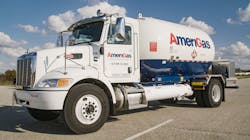The future of propane autogas engine technology
In an ideal world, there would be one clean energy solution that could efficiently power all the world’s needs without interruption. It would lead the charge in decarbonization and would be a one-size-fits-all solution to provide reliable power.
But in the real world, that one energy source doesn’t exist. To provide reliable power and reduce emissions, it will take a variety of clean energy sources, working in the applications where they are best suited, to achieve that goal. Because the more diverse our energy mix is, the more reliable it is. Which is why it’s more important than ever for fleets to do their research on which clean energy source is best suited for their needs.
As medium-duty fleet operations consider the options available to them to do their part in the collective effort to decarbonize, the Cummins B6.7 Propane engine is poised to significantly reduce emissions. The 6.7L displacement engine is built on Cummins’ fuel-agnostic B-series platform and powered with propane autogas. The high-performing, low-carbon engine provides the medium-duty commercial vehicle market with an option that meets day-to-day work needs while reducing emissions. It’s the latest in a long line of evolving engine technology that continues to push the industry further down the path to zero emissions.
Clean energy for today and tomorrow
In testing, the Cummins B6.7 Propane engine delivered the lowest greenhouse gas emissions of any propane autogas-powered engine and will deliver some of the lowest GHG emissions in the medium-duty market. It is also an ultra-low .02 NOx engine that will meet or exceed EPA and CARB regulations in 2024 and 2027.
This innovation gets even cleaner when renewable propane is used in the engine. Renewable propane offers the same benefits as conventional propane—reliability, portability, and power—but with the added benefit of further reduced emissions when compared with other energy sources. Renewable propane is made from a variety of renewable feedstocks, primarily camelina plant oil, vegetable oil, animal fats, or used cooking oil, though it can also be made from soybean oil and animal tallow. It can be used alone or in innovative blends with other renewable or low-carbon energy sources—including conventional propane—to further reduce carbon emissions without sacrificing on performance and while meeting any fleet’s budget. Fleets will be able to easily implement this clean energy source in their own vehicles as it can be used in any existing propane autogas engine or propane autogas infrastructure.
Performance fleets need
The Cummins B6.7 Propane engine will also provide fleets with better-than-diesel performance with a projected power rating of up to 360 horsepower and 860 ft.-lb. of torque. This extends propane autogas to the ceiling of Class 7 (33,000-lb.) vehicles. Plus, fleets also benefit from diesel-like durability, reliability, and uptime. The B6.7 Propane is suited for several applications, including medium-duty trucks, vocational, school bus, and terminal tractor markets.
A cost-effective solution
Fleets that choose to operate with propane autogas will also benefit from a cost-effective solution. When you factor in the cost of a new vehicle and the costs for fuel, fluids, maintenance, and repairs, propane autogas has one of the lowest costs for the lifetime of the vehicle. Compare that to current diesel engines that require aftermarket treatment systems to meet stringent emissions standards. Because propane autogas is a clean fuel, its emissions systems are much less complex and don’t require these added fluids and filters or their associated costs.
That doesn’t take the price of the fuel itself into consideration. As oil prices fluctuate, propane autogas can beat diesel on price per gallon by as much as 50% or more. In most cases, propane autogas suppliers will work with fleets to create a mutually beneficial fuel contract that allows fleets to lock in a set price per gallon for a period of time. This is another layer of protection against fluctuating fuel prices and is especially helpful during times of high gasoline or diesel prices like much of the country is experiencing right now.
The affordability of propane autogas goes even further when fleets consider there are billions of dollars in grant money available for propane autogas vehicles and infrastructure through the 2021 Infrastructure Investment and Jobs Act. Fleets in communities across the country will be able to accelerate decarbonization by easily and affordably adopting propane autogas.
About the Author
Steve Whaley
Director of Autogas Business Development | PERC
Stephen Whaley has managed the over-the-road market portfolio for the Propane Education & Research Council (PERC) since January 2020. He is responsible for growing propane autogas market share in on-highway light-, medium-, and heavy-duty vehicle markets. He focuses on new product research and development, product launches, maintenance and growth in existing market segments, and potential new market development opportunities.
Prior to coming to PERC, Whaley ran his own consulting company for the last four years. Before that, as eastern U.S. regional sales manager for Agility Fuel Solutions in North Carolina, he helped develop Class 7 and 8 vehicle fleet markets for natural gas. He also trained and supported heavy-duty truck dealers with their fleet customers’ adoption into CNG and LNG implementation. Whaley was formerly a director of business development for Roush CleanTech and oversaw propane autogas research and business development for Blossman Propane.
Whaley has a bachelor’s degree in industrial arts education from Virginia Polytechnic Institute & State University, and a master’s degree in industrial education from Clemson University. He has lifetime post-secondary teaching credentials from the State of California.
About PERC: The Propane Education & Research Council is a nonprofit that provides leading propane safety and training programs and invests in research and development of new propane-powered technologies. PERC is operated and funded by the propane industry.

